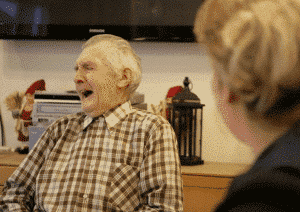The person- centered approach according to Tom Kitwood.

In 1906, the German physician Alois Alzheimer described dementia as a disease. Until then dementia was a consequence of growing old. Old people went into “childhood”. Throughout the 20th century, the paradigm of science has prevailed. Medical science was popular and from around the 1940s onwards, we saw great advances in medical research, among other things within psychological pharmaceuticals. During this period, many people with dementia were admitted to psychiatric wards if their behavior seemed incomprehensible and they were treated with psychoactive drugs. Later, persons with dementia came to nursing homes where they were concerned with “reality-orientations” (Holden and Woods 1988), which meant that the person with dementia constantly was targeted if they said something that was not right. The approach was intended to calm down and to reduce disorientation. The practice just showed that the person with dementia was grief-stricken several times a day if, for example, they asked where their mother was and were told that she had died long ago. In the eighties, Kitwood began to work with the person-centered care. It is also a time when the biomedical paradigm is gaining competition from a more psychosocial approach to people in general and especially to persons with dementia.
Tom Kitwood builds his model on the German philosopher Martin Buber’s understanding of the relationship between people as an “I -you” relationship, as opposed to an “I – it”, where there is a reification of the counterpart. Psychologist Carl Roger’s thinking about a person-centered approach in the therapeutic relationship has also been of great importance. Tom Kitwood’s person-centered approach should be seen as a criticism of the approach to and treatment of persons with dementia. A care that emphasizes the person’s disability and illness. He believes that as part of our cultural heritage we have a degrading approach to people with cognitive disabilities.
According to Kitwood, the person-centered approach means to see the person with dementia as an equal person with feelings, rights, desires and a life story that affected him/her even before she got dementia.
This approach does not have an actual counterpart. It forms the basis for most recent initiatives, for example, Bill Thomas, Eden Alternative (Thomas 1996), and Jane Verity’s Work to Bring the Spark of Life Back to Citizens with Dementia. There is research showing that the person-centered approach has an impact on the quality of life of people, including The Well-Being and Health for People with Dementia (WHELD) Kitwood has made an alternative definition of dementia, and which factors affect the individual person. He thinks that a person with dementia must be understood from both a biological, a psychological and a sociological perspective.
Definition = P + B + H + N + S
• Personality – the person’s resources and defense mechanisms
• Biography – life story / life experiences
• Health – physical condition and sharpness of senses
• Neuropathology – changes in the brain cells
• Social psychology – conditions in the environment – how do we meet the person
The caregiver cannot do anything about the personality if the person has dementia, but can take the background of the individual into account, his/her resources and limitations. The biography and life story is again as it is, but it is a good starting point for any action. We must pay attention to the health of the person as a whole. Often the individual has more diseases or an acute disease, and dementia is not the only disease. Persons with dementia should of course be treated in case of a possible illness. We do not know much about the neuropathological changes in the brain. Medicine works for a period and can improve the ability to function, but the effect is not lasting. As a caregiver, we need to take into account the abilities of the individual and ask of each person with dementia what is relevant for their level. On the other hand, we can do a lot in relation to social psychology. How do we relate to the person and how do we create an environment that the person can enjoy? Kitwood emphasizes that the person with dementia retains his value as a human being throughout the process of the disease. This implies that you get the opportunity to engage in relationships which you appreciate and where you yourself are appreciated. As a human being, one needs to be valued in a community. As people we are dependent on each other’s recognition, respect and trust. These needs do not disappear because you get dementia, but it gets harder to express your needs and fulfill them. It is up to the caregiver to be aware to meet these basic human. The person with dementia cannot do it himself.
In his work, Kitwood emphasized six psychological needs that are essential to all people:
• Love: unconditional acceptance and empathy.
• Comfort: the person needs security, warmth and proximity.
• Identity: is connected to know who one is and have a connection to the past.
• Affiliation: linking ties, relationships with others. To experience confidence and trust in the relationship, so that you have someone to go to in difficult situations.
• Meaningful employment: to participate in your own life in a way that you use your abilities, strength and experience. To feel that you are needed and that you have something to do.
• Inclusion: Being part of a social community and feeling accepted.

People with dementia need support to meet these universal needs.
Tom Kitwood believes that what he calls malicious social psychology can affect people with dementia so they get worse and worse and ultimately do not interact with the outside world or it can cause serious behavioral problems.
The following are examples of what he means when he says malicious social psychology:
1. Threats: To instill fear by using threats or physical power.
2. Neglect: Refuse to give the attention or fulfill an obvious need.
3. Too high pace: To give information too fast, to present choices or to expose the person to pressure to make things faster than person may endure.
4. Being treated like a child: To treat a person downloading as if he/she is a small child .
5. Put stickers on persons: To prosecute or mention the person in an abusive way.
6. Downward assessment: To tell a person that he / she is incompetent, useless, and worthless.
7. Complaint: To accuse a person of actions or lack of action arising from the person’s inability or misunderstanding of the situation.
8. Treason: To use forms of deception in order to distract or manipulate a person or force them to be compliant.
9. Undervalue the person: Not to recognize the persons the subjective reality or feelings
10. Incompatible: Not to allow a person to use the abilities he actually has; not being able to help him complete completed actions.
11. Interference: Force a person to do something to override the desire or refuse the appropriate options
12. Interruption: Interfere suddenly or interfering with a person’s action or consideration: to commit gross breach on their frame of reference.
13. Objectification: To treat people as if they are objects. a bias.
14. Stigmatization: To treat a person negative because of a bias.
15. Ignoring : Continue speech or action with a third person as if the person is not present.
16. Banishment: To send a person away or to exclude him – physically or mentally.
17. Open up to ridicule: To make fun of someone’s “strange” actions or remarks, teasing, humiliating or joking at the expense of the person.
The purpose of this behavior towards the person is not intended malignant but the result of it is.
Kitwood considers it as a conscious or unconscious as part of our cultural heritage, that we think that people with mental disabilities are inferior. They are parked and treated accordingly. It requires constant conscious work with the person-centered model to avoid any of the above examples giving into care. It requires openness for all the caregivers, so this type of approach does not take place.
The opposite of malicious social psychology is “Positive Person Work”. It represents a new care culture focusing on everyday life and community. The positive personal work is what helps build the self-esteem and dignity of person with dementia and contributes to well-being and quality of life.

